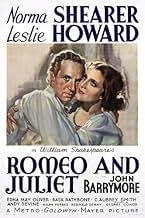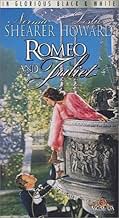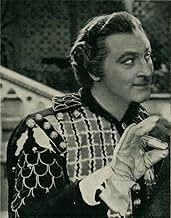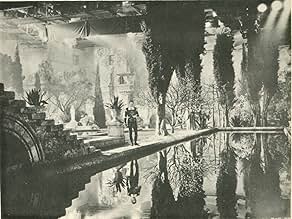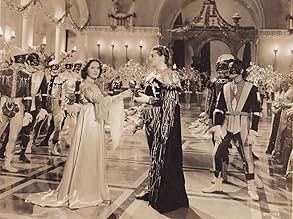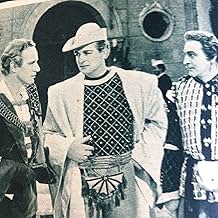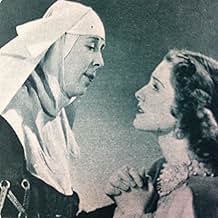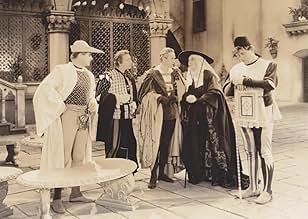VALUTAZIONE IMDb
6,4/10
2351
LA TUA VALUTAZIONE
Aggiungi una trama nella tua linguaYoung love is poisoned by a generations long feud between two noble families.Young love is poisoned by a generations long feud between two noble families.Young love is poisoned by a generations long feud between two noble families.
- Regia
- Sceneggiatura
- Star
- Candidato a 4 Oscar
- 4 vittorie e 5 candidature totali
Charles Bancroft
- Nobleman
- (non citato nei titoli originali)
Dean Benton
- Minor Secondary Role
- (non citato nei titoli originali)
Carlyle Blackwell Jr.
- Tybalt's Page
- (non citato nei titoli originali)
John Bryan
- Friar John
- (non citato nei titoli originali)
Recensioni in evidenza
This production got glitsy treatment by production head Irving G. Thalberg, who was showcasing his wife, Norma Shearer, playing Juliet: two years of research, a crew sent to Verona to photograph parts of the city; reconstruction of Verona's Church of San Zeno on the back-lot; thousands of extras; beautiful costumes and sets, etc. Although the screenplay was shortened, Thalberg also insisted that only Shakespeare's words were to be used in the dialogue. That would be a pleasure for those who knew the play, but a bane for those who didn't. Shakespeare's spoken dialogue isn't very easy to understand. Like any foreign language you learned a little bit in school, you can translate written material and get the gist of what is going on, but try deciphering normal speech in that language and you will be lost. I had a difficult time understanding some of the speeches (almost nothing that John Barrymore was saying) - they flew by me too fast. (On the other hand, I studied Hamlet and Macbeth in school and relish watching movie versions of those plays.) Still, I enjoyed this film, since I knew the general story, and there were sections that didn't tax my knowledge of Shakespearean English. Some of the lines were beautiful. I never new that the expression "star-crossed lovers" was Shakespeare's. Edna May Oliver's comedy was superbly played and the acting of the rest of the cast was excellent. The title characters were supposed to be teenagers, so that both Leslie Howard (at 54) and Norma Shearer (at 31) were a bit old for their parts, but that was a minor point. My advice to anyone wishing to watch this film: read the play first!
Unlike so many of the other commentators below, I am not a fan of Ms. Shearer. In her opening scene, she gushily keeps herself wide-eyed and smiling--all the time acting innocent, while Olivia Hussey and other screen Juliets don't have to act innocent: they are innocent.
That said, this film has much to offer, despite its lacking the passion of other more recent versions. The verse is spoken well, and Barrymore is brilliant as Mercutio. Yes, he's pure ham---but a succulent one. His Mercutio is, as the character's name implies, mercurial as well as absurdist, ironic, and virile. Rathbone is like a living rapier and gets my vote as the best Tybalt the screen has ever seen. However, don't believe producer Thalberg's ballyhoo that every word spoken in this film is from Shakespeare's play: it isn't, although it's close.
That said, this film has much to offer, despite its lacking the passion of other more recent versions. The verse is spoken well, and Barrymore is brilliant as Mercutio. Yes, he's pure ham---but a succulent one. His Mercutio is, as the character's name implies, mercurial as well as absurdist, ironic, and virile. Rathbone is like a living rapier and gets my vote as the best Tybalt the screen has ever seen. However, don't believe producer Thalberg's ballyhoo that every word spoken in this film is from Shakespeare's play: it isn't, although it's close.
Although there were a number of silent versions of Shakespeare plays, and the first direct screen adaptation of his work was in 1929 with the (incidentally very entertaining) Fairbanks/Pickford Taming of the Shrew, it wasn't until the mid-1930s that Hollywood really set its sights on the Immortal Bard. The industry had emerged triumphant from the coming of sound, the worst years Depression and the enforcement of the production code, and now was the time to scale new heights.
Now, Shakespeare was great, and 30s Hollywood was also great, but in a very different way. The two were not entirely incompatible, but there was certainly a lot of scope to get things wrong. And one of the worst things to go wrong in this particular example is casting. A year earlier Warner Brothers had thrown decorum to the winds and simply lined up their usual rogues gallery of wisecrackers for a wild and surprisingly effective edition of A Midsummer Night's Dream. MGM however seemed keener to preserve a sense of theatrical propriety and chose actors for their credentials and experience.
Experience comes with age, and that is really the biggest single problem with these two star-crossed lovers. Norma Shearer gives a powerful and emotionally realistic performance, but she has the demeanour of a woman who has seen a bit of life, as opposed to a girl embarking on her first romance. Lesley Howard would actually make quite a good Romeo, he has the right honest bearing and simple handsomeness, but really he would have to be at least ten years younger. One might argue that if their acting is strong enough, surely we can stretch the imagination a little and overlook their years. This can and does work in some pictures (for example Anne Bancroft only being a little older than Dustin Hoffman in The Graduate), but for Romeo and Juliet it essential that we get that impression of flighty, passionate young lovers whose eventual demise is a tragic waste of life.
But there is worse yet than Shearer and Howard. The very acme of bad casting is here represented by John Barrymore as Mercutio. Don't get me wrong, Barrymore is comically eccentric, but Mercutio is supposed to be a sly young rake, not some jolly middle-aged lecher. And remember the character was named after his mercurial temperament (meaning quickly changing mood), yet Barrymore is just incessantly merry. Mercutio's greatest moment – the Queen Mab speech – is reduced to a wittering ramble. Another mistake of the casting couch was Andy Devine as Peter the servant. Devine is funny, and could even have been an asset in a Shakespearean comedy, but he is not right here. There are meant to be a few laughs in Romeo and Juliet, but not from some inept twerp. His inclusion in the opening brawl (the lines he speaks here belong to another character) is ridiculous, and sets absolutely the wrong tone.
This was an Irving Thalberg production, and Thalberg was probably the finest of the old-style producers, having a real knack for putting together the right team and then graciously leaving them to it. It's unlike him to make so many blunders with principle casting, but at least he got a decent crew. George Cukor was a good choice for director, as he was already the best when it came to stage-to-screen adaptations. He fills the earliest scenes with all sorts of bustle and background movement, then makes everything simplified and stripped down as the drama intensifies, focusing everything on the performers. William Daniels's cinematography is stunning, rich in light and shadow, the standout being the dance scene in which Howard is crisply black and Shearer shimmering white, with the background figures a wash of grey. Even on the acting front it's not all bad. Edna May Oliver is spot-on as the nurse, with her almost guttural delivery complementing the character's lewdness. And Basil Rathbone gives a calm, calculated performance, keeping all Tybalt's aggression simmering below the surface.
It was around this time that Laurence Olivier claimed Shakespeare could never work on screen, saying, "The shot is too big for the cannon". Of course, he would soon swallow his words and become the foremost actor, director and producer of Bard movies. His statement was born from the snobbishness of a naïve young theatre devotee, but one can't help thinking that such lukewarm offerings as this Romeo and Juliet only served to back up his opinion.
Now, Shakespeare was great, and 30s Hollywood was also great, but in a very different way. The two were not entirely incompatible, but there was certainly a lot of scope to get things wrong. And one of the worst things to go wrong in this particular example is casting. A year earlier Warner Brothers had thrown decorum to the winds and simply lined up their usual rogues gallery of wisecrackers for a wild and surprisingly effective edition of A Midsummer Night's Dream. MGM however seemed keener to preserve a sense of theatrical propriety and chose actors for their credentials and experience.
Experience comes with age, and that is really the biggest single problem with these two star-crossed lovers. Norma Shearer gives a powerful and emotionally realistic performance, but she has the demeanour of a woman who has seen a bit of life, as opposed to a girl embarking on her first romance. Lesley Howard would actually make quite a good Romeo, he has the right honest bearing and simple handsomeness, but really he would have to be at least ten years younger. One might argue that if their acting is strong enough, surely we can stretch the imagination a little and overlook their years. This can and does work in some pictures (for example Anne Bancroft only being a little older than Dustin Hoffman in The Graduate), but for Romeo and Juliet it essential that we get that impression of flighty, passionate young lovers whose eventual demise is a tragic waste of life.
But there is worse yet than Shearer and Howard. The very acme of bad casting is here represented by John Barrymore as Mercutio. Don't get me wrong, Barrymore is comically eccentric, but Mercutio is supposed to be a sly young rake, not some jolly middle-aged lecher. And remember the character was named after his mercurial temperament (meaning quickly changing mood), yet Barrymore is just incessantly merry. Mercutio's greatest moment – the Queen Mab speech – is reduced to a wittering ramble. Another mistake of the casting couch was Andy Devine as Peter the servant. Devine is funny, and could even have been an asset in a Shakespearean comedy, but he is not right here. There are meant to be a few laughs in Romeo and Juliet, but not from some inept twerp. His inclusion in the opening brawl (the lines he speaks here belong to another character) is ridiculous, and sets absolutely the wrong tone.
This was an Irving Thalberg production, and Thalberg was probably the finest of the old-style producers, having a real knack for putting together the right team and then graciously leaving them to it. It's unlike him to make so many blunders with principle casting, but at least he got a decent crew. George Cukor was a good choice for director, as he was already the best when it came to stage-to-screen adaptations. He fills the earliest scenes with all sorts of bustle and background movement, then makes everything simplified and stripped down as the drama intensifies, focusing everything on the performers. William Daniels's cinematography is stunning, rich in light and shadow, the standout being the dance scene in which Howard is crisply black and Shearer shimmering white, with the background figures a wash of grey. Even on the acting front it's not all bad. Edna May Oliver is spot-on as the nurse, with her almost guttural delivery complementing the character's lewdness. And Basil Rathbone gives a calm, calculated performance, keeping all Tybalt's aggression simmering below the surface.
It was around this time that Laurence Olivier claimed Shakespeare could never work on screen, saying, "The shot is too big for the cannon". Of course, he would soon swallow his words and become the foremost actor, director and producer of Bard movies. His statement was born from the snobbishness of a naïve young theatre devotee, but one can't help thinking that such lukewarm offerings as this Romeo and Juliet only served to back up his opinion.
For years, I put off watching this version of Shakespeare's classic love story, knowing that all the main players were about thirty years too old for their roles. Finally, when the film came on late on night, I decided to take a look, because I do admire the work of so many of the players.
Provided you can put aside the problems of the ages of the actors, the result is a very pleasant surprise. The biggest surprise for me was the performance of Norma Shearer - I've always liked her work, but considered her rather lightweight for Shakespeare. Not so - she delivered her lines with a great feel for the style and pace, and was as delightful and open a Juliet as one could wish. Her age became irrelevant; this was a young girl new to love, completely swept off her feet and ready to surrender all - for the first time.
Leslie Howard was also comfortable with the Shakespearean dialogue, if slightly lacking the boyish passion we rightly expect to see. He was more the slightly older suitor, taken by surprise with the fresh appeal of his Juliet, but ready to cast aside previous attachments to pursue and win her. His lovely voice delivered the lines with ease and fluency.
John Barrymore's Mercutio was much more the ageing playboy than the dashing young blade, but his sure touch with the dialogue showed clearly why he was considered the preeminent Shakespearean actor of his day in America. His delivery of the "Queen Mab" speech was a delight. His body was way too old, but his spirit lacked nothing.
Flora Robson came near to stealing most of her scenes, as she so often did, and Basil Rathbone was fully at home in the role of Tybalt; fine performances from these two, as we would expect from their backgrounds.
It was, to my mind, rather over-produced, with the actors in danger of being lost in the expansive sets, but remembering that had these actors been performing on stage, we wouldn't bat an eyelid at their ages, they provide us with an engrossing experience and deliver a play that even the experts couldn't fault.
Provided you can put aside the problems of the ages of the actors, the result is a very pleasant surprise. The biggest surprise for me was the performance of Norma Shearer - I've always liked her work, but considered her rather lightweight for Shakespeare. Not so - she delivered her lines with a great feel for the style and pace, and was as delightful and open a Juliet as one could wish. Her age became irrelevant; this was a young girl new to love, completely swept off her feet and ready to surrender all - for the first time.
Leslie Howard was also comfortable with the Shakespearean dialogue, if slightly lacking the boyish passion we rightly expect to see. He was more the slightly older suitor, taken by surprise with the fresh appeal of his Juliet, but ready to cast aside previous attachments to pursue and win her. His lovely voice delivered the lines with ease and fluency.
John Barrymore's Mercutio was much more the ageing playboy than the dashing young blade, but his sure touch with the dialogue showed clearly why he was considered the preeminent Shakespearean actor of his day in America. His delivery of the "Queen Mab" speech was a delight. His body was way too old, but his spirit lacked nothing.
Flora Robson came near to stealing most of her scenes, as she so often did, and Basil Rathbone was fully at home in the role of Tybalt; fine performances from these two, as we would expect from their backgrounds.
It was, to my mind, rather over-produced, with the actors in danger of being lost in the expansive sets, but remembering that had these actors been performing on stage, we wouldn't bat an eyelid at their ages, they provide us with an engrossing experience and deliver a play that even the experts couldn't fault.
The Adrian (and Messell) costumes are magnificent. The sets & cinematography are beautifully realized & director George Cukor does the best he can with what he has been given but the absurd casting of actors 20 years, or more, too old cannot be ignored. Juliet is supposed to be around 13 & Norma Shearer is in her mid 30s. Romeo is to be approximately 16. Leslie Howard is in his mid 40s. The foolish, romantic & tragic path taken by Romeo & Juliet is because of their youth. With these 2 way too old actors, it makes the characters behave as if they are developmentally challenged. It is not how adults behave. I'm am not a student of Shakespeare but I've read the play. Many necessary cuts were made to the text in order to get it to the screen or it would've ended up being over 4 hours long. I don't complain of these cuts. I don't complain of the line readings by some actors. I respect how the studio & Thalberg put the money & attention to detail into the production. Accomplished Shakespearean acting coaches were brought in to get the best performances from the actors. I believe Norma Shearer worked hard to do her best but oh my. She is not Juliet. Leslie Howard is ok but both wouldve been better cast as Lord and Lady Montague or Lord and Lady Capulet. It is a lush & lavish production. I can admire it as a beautiful elegant bauble. If I don't pay close attention to the actors, I can enjoy the spectacle but I cannot accept Shearer & Howard as the lead characters. It's a distraction I cannot pretend isn't there. That they are too old is a valid reason to critique the movie harshly.
Lo sapevi?
- QuizThe film contains the only on-screen sword fight that expert swordsman Basil Rathbone won in his entire film career.
- Citazioni
Juliet - Daughter to Capulet: My bounty is as boundless as the sea, My love as deep. The more I give to thee, The more I have, for both are infinite.
- ConnessioniFeatured in Master Will Shakespeare (1936)
I più visti
Accedi per valutare e creare un elenco di titoli salvati per ottenere consigli personalizzati
- How long is Romeo and Juliet?Powered by Alexa
Dettagli
- Data di uscita
- Paese di origine
- Sito ufficiale
- Lingua
- Celebre anche come
- Romeo and Juliet
- Luoghi delle riprese
- Azienda produttrice
- Vedi altri crediti dell’azienda su IMDbPro
- Tempo di esecuzione2 ore 5 minuti
- Colore
- Proporzioni
- 1.37 : 1
Contribuisci a questa pagina
Suggerisci una modifica o aggiungi i contenuti mancanti

Divario superiore
By what name was Giulietta e Romeo (1936) officially released in India in English?
Rispondi

